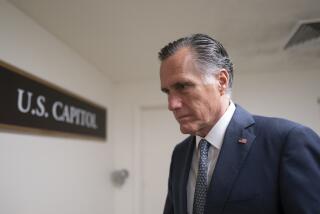Neither Romney nor Obama can fix the frenzy in the Arab streets
Last week, simultaneous with a mob attack on the U.S. Embassy in Cairo and the slaying of an American diplomat in Benghazi, Libya, Mitt Romney tried to lay blame for the incidents on what he said was President Obama’s weak foreign policy. He was aiming to hurt Obama, but did himself greater harm.
The inaccuracy and poor timing of his attack made it look exactly like what it was: shallow politicking at a moment of national crisis. Romney should get additional demerits for simplistic thinking.
By claiming that Obama’s weakness had emboldened Islamic malcontents to lay siege to U.S. diplomatic outposts, he clearly implied such things would not happen were he to become president. If Romney really believes this, he lacks a realistic grasp of foreign affairs.
Of course, there is a good chance he does not believe it, any more then he believes most of the other words he spouts on the campaign trail.
The man appears to be scripted by handlers who have no other concern than finding a daily attack line -- which is exactly the sort of shortsighted tactic that keeps Romney on constant defense, trying to contain the damage caused by one ill-considered comment after another.
Romney is not the first presidential candidate to imply he can wave a magic wand -- or, more precisely, Teddy Roosevelt’s big stick -- and remake the world to the liking of the United States. Most of those who aspire to the presidency make a similar claim (with Ron Paul being the most recent laudable exception). Candidates try to act like masters of the universe to impress voters who want to believe a proper president can accomplish anything.
Of course, by imagining they are electing a sort of superhero, voters set themselves up for disappointment and disillusion over and over again. Sure, a president can topple a dictator if he wants to utilize the vast power of the American military. But it’s not so easy to clean up the ensuing mess. And anyone who expects that a president can tame the random eruptions of frenzied mobs in faraway places is kidding themselves.
The swarming packs of young men in Cairo and Benghazi and Tunis and Beirut spend their days looking for any excuse to vent their deep frustrations and anger. This time around, the excuse was a ridiculously amateurish YouTube preview of a movie that may not even exist, made by a shadowy character who claims to be an Israeli Jew but may, in fact, be an Egyptian Coptic Christian.
The film clip’s slanders of the prophet Muhammad may have been the spark that set off the wildfire of protest, but the underlying and perpetual causes of such violence are much deeper grievances -- some as contemporary as the chronic joblessness of young Arab men, some as ancient as the blood feuds between Muhammad’s successors.
A long line of American presidents helped keep the lid on the seething antagonisms in Muslim lands by backing dictators who repressed both the best and worst impulses of their people. Now those strongmen are disappearing, one by one, and the lid has blown off. Our idealistic American hearts want to celebrate this burst of liberation, but our worried minds wonder if a whirlwind has been let loose.
In the Islamic world, Americans are frequent targets, but we are neither the root cause of the region’s trouble nor the magicians who can make all problems disappear. An American president can prod, manage, contain and intervene, but he can seldom transform. The people of the Middle East will have to do that for themselves. Only when they perceive that they are authors of their own agony will they become masters of their own fate.
More to Read
A cure for the common opinion
Get thought-provoking perspectives with our weekly newsletter.
You may occasionally receive promotional content from the Los Angeles Times.











